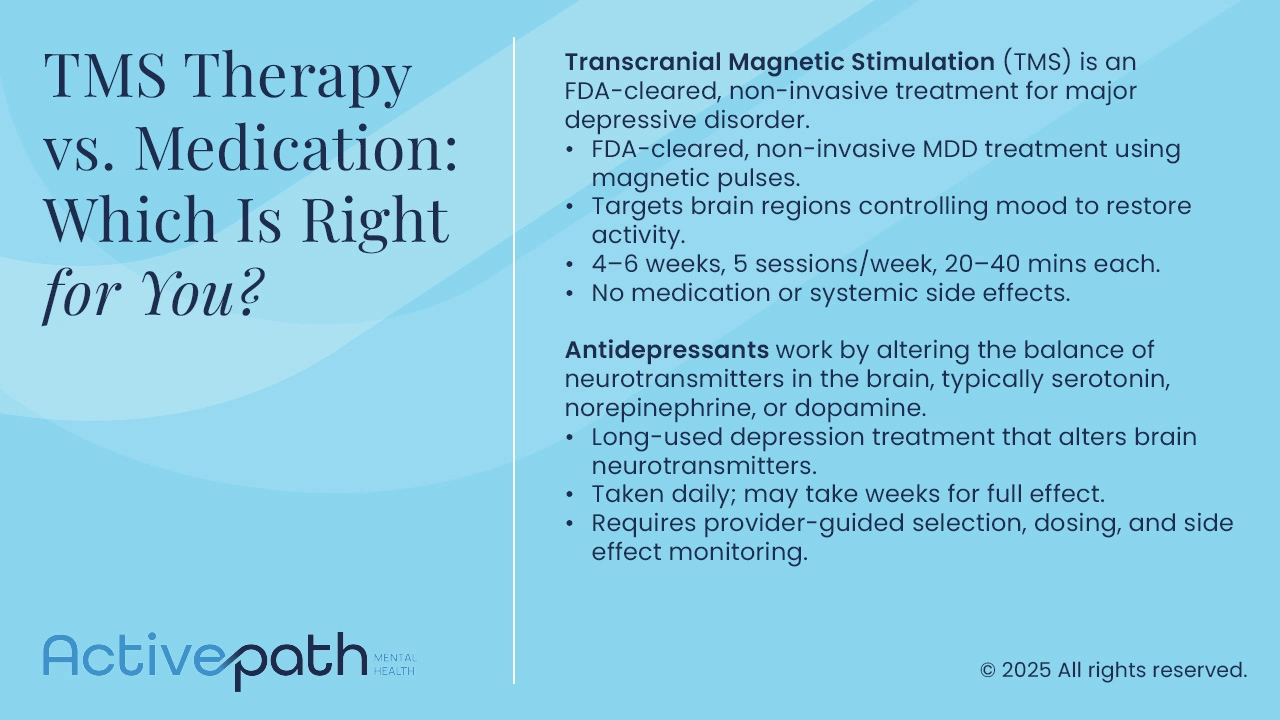For those struggling with depression, finding an effective treatment can feel like navigating a maze, especially when symptoms linger or return after multiple attempts at relief. Two of the most well-established mental health treatment options available today for severe depression are medication management and Transcranial Magnetic Stimulation (TMS) therapy. But how do you know which one is right for you?
At Active Path Mental Health, we serve the Kirkland and Vancouver, WA, the greater Portland metro and Salem with personalized, evidence-based mental health care. Our integrated approach includes TMS, Spravato, talk therapy, and medication management, helping patients at all stages of their journey find sustainable paths to wellness.
Here, we’ll break down the differences, benefits, and drawbacks of TMS therapy and antidepressant medications, empowering you with the knowledge you need to make the best decision for your mental health.
Not sure whether TMS or medication is right for you? Schedule a personalized consultation at Active Path today or call 503.719.4648.
Understanding the Basics: TMS vs. Medication
Before comparing their pros and cons, let’s clarify how each treatment works. Both TMS and medication are widely used for treating major depression. This section will provide an overview of how TMS and medication function as options for depression treatment.

What Is TMS Therapy?
Transcranial Magnetic Stimulation (TMS) is an FDA-cleared, non-invasive treatment for major depressive disorder (MDD). It uses magnetic pulses to stimulate specific areas of the brain responsible for mood regulation, typically the prefrontal cortex. These pulses help “reset” brain circuits that may be underactive in individuals with depression.
TMS works by targeting magnetic pulses to stimulate nerve cells in the dorsolateral prefrontal cortex, which plays a key role in mood regulation and executive function. TMS therapy aims to restore normal neural activity in this region and improve depressive symptoms in patients with depression.
TMS is delivered over a course of 6-8weeks, usually five sessions per week. Each session lasts about 3-20 minutes and is conducted in an outpatient clinic like Active Path under the supervision of a mental health provider. Importantly, TMS does not involve medication or systemic side effects.
What Is Medication Management?
Antidepressants, including SSRIs (Selective Serotonin Reuptake Inhibitors), SNRIs (Serotonin-Norepinephrine Reuptake Inhibitors), tricyclic antidepressants, and other classes, work by altering the balance of neurotransmitters in the brain, typically serotonin, norepinephrine, or dopamine. As traditional medications, antidepressants have been used for decades to treat depression. Antidepressants aim to alleviate depressive symptoms by targeting these neurotransmitters and restoring chemical balance. These medications are taken daily and often require several weeks to take full effect.
Medication management involves working closely with a mental health provider to find the right medication and dosage, monitor progress, and manage any side effects. It is important for a healthcare provider to consider a patient’s medical history when prescribing medication, as this influences drug selection, dosage, and monitoring. At Active Path, our medication management services are personalized and collaborative, ensuring every patient’s unique needs are met.
The Benefits of TMS Therapy
TMS therapy has gained momentum in recent years, especially for individuals who have tried medication with little to no success. As a drug-free alternative, TMS therapy offers a non-invasive, targeted approach to treating depression without the side effects commonly associated with medication. TMS treatment can be particularly beneficial for patients who have not responded to traditional antidepressants.
1. Non-Invasive and Drug-Free
TMS does not involve oral medications, injections, or anesthesia. This makes it a great option for patients concerned about medication side effects, interactions with other prescriptions, or long-term pharmaceutical use.
2. Minimal Side Effects
Unlike antidepressants, which can cause weight gain, fatigue, sexual dysfunction, gastrointestinal issues, or sleep disturbances, TMS is well-tolerated. The most common side effects include mild scalp discomfort or headache, usually resolving within the first few sessions.
3. Targeted Brain Stimulation
TMS directly targets the areas of the brain associated with depression, offering a localized and precise treatment. TMS uses a magnetic pulse to stimulate nerve cells in specific brain regions involved in mood regulation. This focused approach allows the brain to reawaken neural pathways more effectively over time, promoting healthier mood regulation.
4. Effective for Treatment-Resistant Depression
If you’ve tried two or more medications without success, you may be dealing with treatment-resistant depression (TRD). Studies show that TMS can be highly effective in these cases, serving as one of the most effective treatments for TRD. Research demonstrates that TMS leads to positive outcomes and a significant clinical response, with many patients experiencing measurable improvement in their depression symptoms.
The Limitations of TMS Therapy
While TMS has many benefits, it’s not for everyone. TMS therapy typically involves multiple sessions as part of a structured treatment course, which can require a significant time commitment for patients.
1. Time Commitment
TMS requires frequent in-office visits—typically five days a week for six to eight weeks. For some, this schedule may be challenging, especially if you have a demanding job, caregiving responsibilities, or limited transportation options.
2. Insurance and Cost Considerations
Although most major insurers cover TMS for treatment-resistant depression, prior authorization is often required. Out-of-pocket costs can vary, so it’s important to verify your benefits before starting treatment. At Active Path, our administrative team helps patients navigate this process, taking care of the prior authorization process.
3. Not a First-Line Treatment
TMS is not typically the first treatment recommended for someone newly diagnosed with depression, as medication is generally considered the ‘go-to treatment’ in these cases. It’s often explored after trying at least one or two medications without adequate improvement. However, for children ages 15-17, it is often the first-line treatment.
The Benefits of Antidepressant Medication
Medications remain the most common first-line treatment for depression and for good reason. Among the available treatment options for depression, antidepressant treatments are a widely used treatment option due to their accessibility, flexibility, and often effective results.
1. Widespread Availability
Antidepressants are widely available and easily prescribed by primary care providers, psychiatrists, and nurse practitioners. They’re also covered by nearly all insurance plans.
2. Effective for Many People
For many patients, antidepressants provide substantial relief, especially when combined with therapy or lifestyle changes. They’re also available in multiple classes, allowing for fine-tuned treatment plans based on your body’s response.
3. Flexible and Convenient
Medication is typically taken once daily at home, making it more convenient for those with busy schedules or limited access to in-person care.
The Drawbacks of Antidepressant Medication
Despite their popularity, medications come with challenges, particularly for patients who don’t respond well to standard treatment. Additionally, abruptly discontinuing antidepressant medication can lead to withdrawal symptoms, which may pose further difficulties for some individuals.
1. Side Effects
Common side effects include fatigue, insomnia, nausea, weight gain, and sexual dysfunction. For some, these side effects become barriers to consistency or quality of life.
2. Trial and Error
Finding the right antidepressant can be a frustrating and time-consuming process. It may take several weeks—and several attempts—to find the best match for your symptoms.
3. Potential Interactions
Patients on multiple medications or with chronic conditions must consider drug interactions. Additionally, those undergoing hormone therapy (such as in LGBTQIA+ care) may have additional considerations that require close monitoring.
How to Decide: TMS or Medication?
There’s no one-size-fits-all answer. Your decision should be based on your symptoms, history, lifestyle, and personal preferences. It is important to consult a mental health professional or healthcare professional to help determine the most appropriate treatment for your needs. Mental health treatment for depression should be individualized and guided by expert advice. Here are a few helpful guidelines:
- If you’re new to treatment and want to start with something accessible and low-barrier, medication may be a good place to begin.
- If you’ve tried multiple antidepressants without success or cannot tolerate their side effects, TMS may offer a new path forward.
- If you’re looking for a drug-free option or prefer not to rely on daily pills, TMS could be a better fit.
- If convenience and portability are your top priorities, medication might offer more flexibility.
It is important to note that you can also take antidepressants when going through TMS treatment, and some patients achieve a greater synergy and outcome due to the combination of treatments. At Active Path, we don’t believe in forcing patients into a mold. We listen first, then create a treatment plan that’s uniquely yours.
Active Path: Your Partner in Personalized Mental Health Care
Whether you’re exploring treatment for the first time or are ready to try something new, Active Path Mental Health is here to help. Our clinics across Washington and Oregon offer comprehensive services to support your journey, including:
- TMS therapy supporting a variety of mental health conditions and addressing the full range of depression symptoms
- Medication management that respects your preferences and unique needs
- Talk therapy grounded in empathy, evidence, and empowerment
- Spravato
- Culturally affirming care, including services tailored to LGBTQIA+ patients and individuals with complex mental health needs
We’re more than a clinic—we’re a compassionate team committed to helping you heal, grow, and thrive.
Next Steps: What Should You Do Now?
If you’re unsure whether TMS or medication is right for you, we invite you to schedule a free phone consultation with Active Path.
You don’t have to settle for “just getting by.” Relief is possible, and you deserve a mental health plan that truly works for you.
Take the Next Step in Your Journey
At Active Path Mental Health, we empower you with options, education, and evidence-based tools to manage your mental health. Whether you’re interested in TMS, medication, or both, we’re here to guide you with compassion and expertise.
Take the guesswork out of depression treatment—explore your options with our team at Active Path or call or call 503.719.4648.









